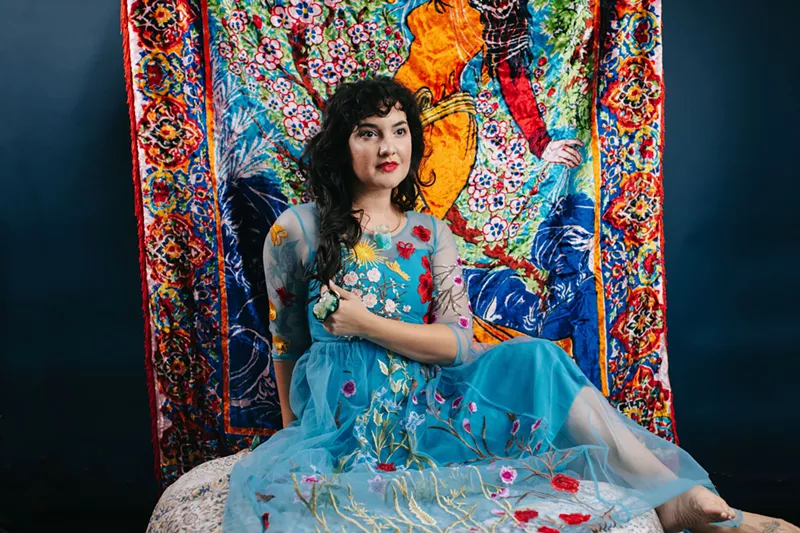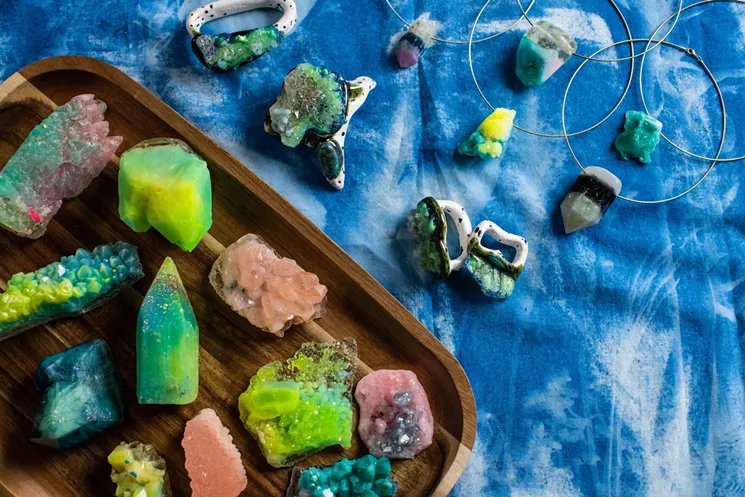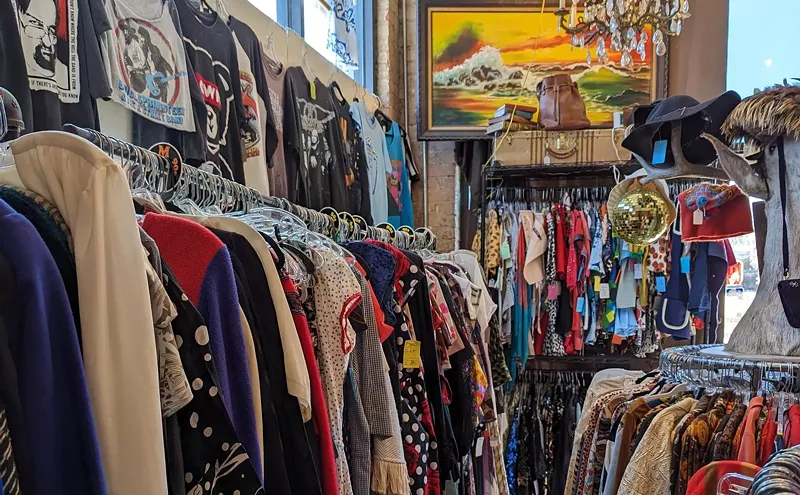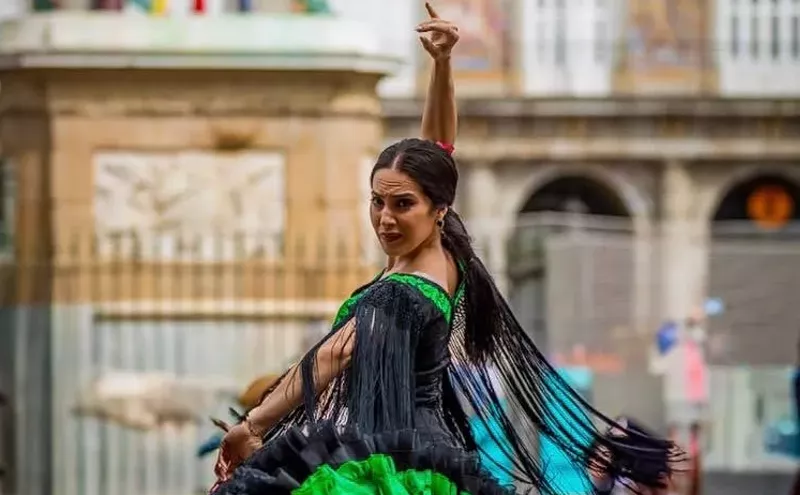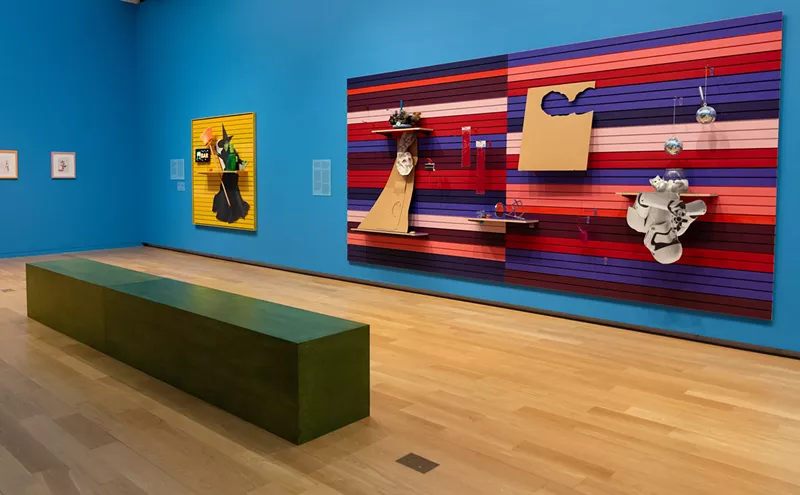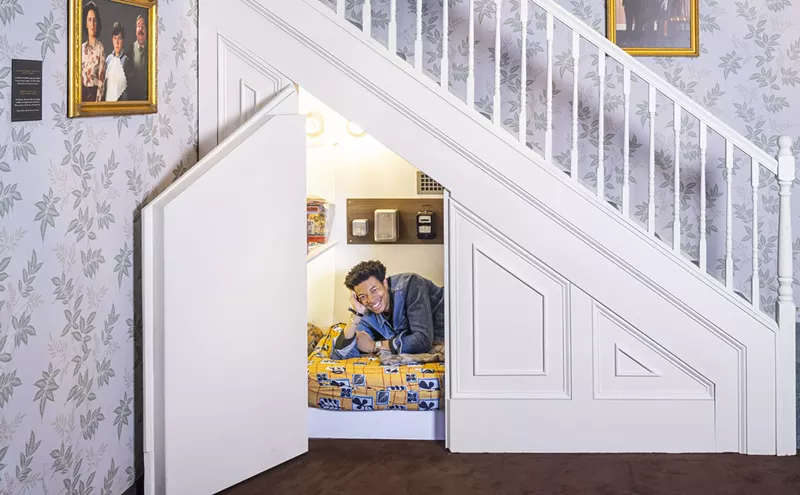Shamsy Roomiani is a “strongly agree” kind of person. Without hesitation, she often starts answers to questions by saying “ab-so-lu-tely.” It’s not that she’s impulsive or excessively agreeable; she’s simply way ahead of your questions.
This assertiveness and her confidence in her own vision have allowed the young artist to turn her name into a brand — “Shamsy” — for the jewelry, herbal bundles and art installations she creates. The pandemic has made promoting her brand harder because of economic and social disruption. But, at the same time, Shamsy and others who traffic in New Age spiritualism and similar practices have seen demand for their works increase as an anxious public looks for reassurance in a shaken world.
Shamsy grew up in Richardson with a father who immigrated from the Middle East and a mother whose family has been in America “since before the Revolution.” After graduating from the University of North Texas with degrees in printmaking and marketing in 2007, she blossomed on the Dallas art scene with a body of work based on plants and nature.
She moved from prints to her first specialty, cyanotypes, an analog form of photography in which one can “print” flowers and plants directly to paper. Later, she created what she calls “Shamstones,” often glow-in-the-dark, neon-colored crystals that she incorporates into jewelry, chandeliers and other works. She also makes smudge sticks —bundles such as sage with purported cleansing properties — and patrons now are burning them faster than she can make them.
Around town, the choicest boutiques and gift shops have taken stock in her Earth-witch mood boards, which are something like collages that evoke a style. From murals in Deep Ellum tagged with her logo, the name “Shamsy” on the body of a snake, to fragrant smoke cleansing negative energy out of uptown homes, parts of Dallas seem to be under her spell.
As a one-woman operator, Shamsy’s productivity hasn’t been derailed by the pandemic. Her ability to exhibit her work and sell her products to stores, however, have been riddled with obstacles as her contacts were laid off and shops stopped ordering.
Shamsy has hustled harder than a ‘70s disco dancer to become ubiquitous in the local art scene. Her followers include children and celebrities, among them actor Jason Lee from Almost Famous and My Name Is Earl, who commissioned his second hand-bound journal from Shamsy this summer.“Shamsy’s artworks bring us back many moons and worlds before us.” – Brandy Michele Adams, WAAS Gallery.
tweet this
“It’s exhausting,” she says of networking and self-promotion. “And it can get in the way because I want to be creative and ride the fluidity of my feelings and my emotions at the time and just pour it into a piece. … I have some orders that are needing to be shipped, and it's a little weird having to switch gears, and kind of have to compartmentalize.”
Before the pandemic, she frequently exhibited at Dallas galleries. She had interactive installations at Sweet Tooth Hotel, where her sound-activated, light-up wall of cotton-candy clouds was a crowd favorite, and at WAAS Gallery, where she had two shows in 2019.
Green Room, her solo show at the latter, included a meditation room that soothed art critics and a plant-filled pyramid installation that made a perfectly offbeat photo op.
“Shamsy’s artworks bring us back many moons and worlds before us,” says Brandy Michele Adams, who owns WAAS Gallery. “Her fine art connects you further to nature while her prints are living, and the installations are full of vibrant tones that energize the mind and body whether in a collection or corporate office. Shamsy brings life into any space she touches.”
The true weight of a brand, however, can be measured in its potential for knock-off imitations. Other pop-up galleries have been, let’s say, heavily inspired by her work, with glistening neon crystals and light-up clouds adorning the walls in their installations.
“What’s that saying about copying being flattery?” Shamsy asks.
“But I feel like it's hard not to take offense or to take it to heart,” she says. “When you've worked so hard to create an aesthetic or create a voice and someone just decides ‘I don't want to do the work. It's already done for me. It's already a good thing they've got going. Let me go ahead and scoop that up and take it and make it my own.’ It's disconcerting, and it's a lot. I try not to let it get to me, but it does sometimes.”
In the past few years, she has taught workshops at the Nasher Sculpture Center, which she continues via video during the pandemic. She collaborated with the Mavericks on a poster. This year, she also became an honorary Helium Queen. The Dallas band Helium Queens, known for their neon getups and fantastical theatricality, incorporated Shamsy into their world, where she played herself as a “goddess fortune teller person” in a music video directed by Sarah Zass.
“We wrote Shamsy into the Helium Queens ‘Youniverse’ because she belonged there,” says Helium Queens mastermind Poppy Xander. “She’s magical. When I first saw her Shamstones and the way she interpreted nature, I knew she was a fringe original with the ability to see beyond traditional barriers and boundaries.
“When you take someone like that and allow them a world to express that in a ‘fictional’ character, you get an archetype, someone who understands transcending into the creative consciousness of the universe,” Xander says. “Shamsy is a visionary. She can see it all, from the set design to the costume and persona, bringing with her a complete picture of what could be and maybe, what really is.”
Other artists are linking their creative worlds to Shamsy’s, too. Florida-based Jym Davis, who is known for his outlandish avant-garde papier-mâché masks, recently collaborated with Shamsy in a creation that integrated her Shamstones and is now on display in Tennessee.
“Even though our stuff is dramatically different, we have a lot of stuff in common, like nature and environmentalism and conservation,” Shamsy says of Davis. “He always photographed his masks in these crazy landscapes, so the whole image just looks like, you know, otherworldly aliens. … And then he also has a performance aspect to it, which I've been doing, too, like I did this video with Poppy and the Helium Queens. So there's this weird performance to both of our work in a way.”
The collaboration was born out of a connection made on Instagram. The platform remains a tool for artists to showcase on a global scale from the comfort of their homes, but as the site demands ads and promotion from those clamoring to be seen, it’s forcing artists to moonlight as influencers, selling their lifestyles as much as their art, having to maintain their inspiration while producing entrepreneurial-focused content.
“Totally, Totally. Oh, my gosh, absolutely,” Shamsy says. “And it is so exhausting to be a cheerleader and to be a personality as well as the genuine artist pouring your feelings out into your work. But then you have to put your personality and your character out there to gain such a superficial thing like ‘likes’ and stuff.”
Shamsy notes that Instagram, once a medium to share photography, now limits the number of users who can see a member’s posts organically through their feeds, resulting in artists churning out daily posts and having to pay to sponsor their content.
“I hate to even talk about Instagram,” she says. “But it was a big tool that creatives used to connect with establishments and people that we wouldn't normally have access to, and to grab these people's attention. And this year, with that algorithm changing, it's like, this year more than ever we needed Instagram to have our backs and help have connections with people. … When we need them the most they really weren't there for us.”
While she may not have the time or inclination to post “50 times a day” on Instagram, as she says her peers are doing out of necessity, it’s not hard to see why followers would be eager to seek her influence. Shamsy’s world offers a culture of flowery enchantment that won’t be compromised, even for commissions.
The pandemic, she says, may have scrambled her contacts and created “a big disruption in the way of my livelihood,” but, prompted by mass uncertainty, an uptick in interest in the metaphysical and alternative healing arrived at the right time for her work.
Over the past few years, Shamsy says, even some skeptics began riding a New Age wave. As Eastern practices such as meditation became incorporated into mainstream wellness, alternative medicines like CBD gained wider acceptance.
“Now you see all these CBD oil places and, you know, shamanistic places that have opened up mostly last year,” she says. “I was actually looking at dog shampoo today with CBD oil.”
She finds that the pandemic has solidified the popularity of products such as hers.
“Absolutely,” she begins. “I mean, and I'm not just talking about, you know, my products themselves. But across the board, I'm really heavily into that scene.”
She brings up a story she saw recently in which a “mainstream” glossy interior décor magazine included a photo of a home with a smudge stick burning front and center.
“And I'm just like, oh, that's hilarious,” she says. “I mean, that's great. I'm so happy that people are looking for other avenues to meditate and, you know, have a place to heal and kind of take care of their mental health issues.
“It's just an outlet, like the crystal shops,” she says. “Everything has been so busy, and I feel most of all, I’d say I've definitely seen such an increase this year in smudging — which is definitely gaining the last couple of years, but for sure this year — because it has an element of purification and since we're all secluded in our homes.”
At the moment, Shamsy’s hopes boil down to a recurring daydream: working with a fellow mystic, queen of neo-soul Erykah Badu. Until then, she wrote in a text sent with an angel emoji: “This year has taught me that I am so thankful and grateful for relationships with true genuine friends, Texas state parks, my plants, yoga, and self-care rituals.”
Others who share Shamsy’s mystical bent find their work also is gaining new attention during the pandemic, which makes sense. If ever there was a time to do an inventory of our beliefs, 2020 would be the year. Whether it’s our faith in the democratic process, trust in science or illusions of job security, the entire year has been a test of faith.
According to a survey by the Pew Research Center, about 24 percent of adults say their faith has grown during the pandemic. Adults surveyed include members of all major faiths along with agnostics, atheists and people who aren’t affiliated with any practice.“It’s going to be a black winter,” Brooklyn Bruchert, tarot and rune reader
tweet this
The year’s anxieties have even propelled other forms of spirituality and a search for answers via psychics, astrologers and card readers.
Brooklyn Bruchert, a Dallas resident who specializes in tarot and rune readings, says that despite the pandemic, most of her clients are seeking answers about one driving aspect in their lives: love.
“To tell you the truth, it’s not the best time [to look for love],” Bruchert says.
Bruchert has been practicing card and rune reading for more than 20 years. She doesn’t consider herself psychic but says she communicates with gods and goddesses and only does card readings for close friends and family.
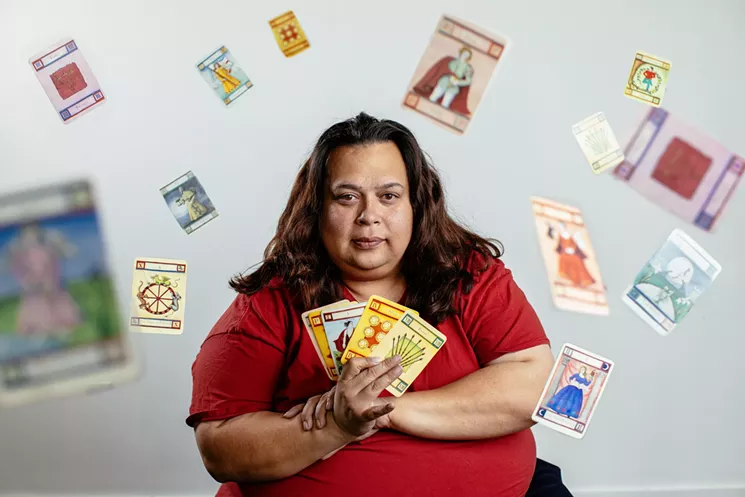
Brooklyn Bruchert, a Dallas resident who specializes in tarot and rune readings, says that despite the pandemic, most of her clients are seeking answers about one driving aspect in their lives: love.
Kathy Tran
Bruchert says she doesn't want to associate her tarot readings with politics, as she believes this could be “dangerous.” Our interview was conducted before the election, and Bruchert says that when clients ask her any questions related to President Donald Trump, she immediately shuts them down.
She does, however, warn us that this winter will likely see a surge in COVID cases, eliciting mass panic similar to that of this past March.
“It’s going to be a black winter,” Bruchert says. “And you don’t need to be psychic to see that shit. Once the flu season starts kicking up, everyone’s going to go through another panic. There will be stay-at-home orders and another toilet paper shortage. Everyone wants to do a do-over for 2021, but I seriously doubt that’s going to happen. All we can do right now is just pray.”
Like Bruchert, East Dallas resident Nicholas Fly also doesn’t consider himself psychic. He is a practicing Wiccan who occasionally has prophetic dreams, but who doesn’t claim to be clairvoyant.
Fly has been practicing Wicca for 21 years. Born and raised in “middle of nowhere” Tennessee on a 148-acre farm, Fly has always felt close to nature.
While he can’t meet with his coven for the time being, he’s used this time to get in touch with his emotions and find healing.
“It's been a bit of a blessing to have this much time to be able to focus on my spirituality,” Fly says. “I’ve had plenty of time to do my rituals when I want to. I’ve been able to work on my projects, read more and meditate more.”"There is just something that is so much more spiritually connecting when you're dancing naked in a circle with people." – Nicholas Fly, Wiccan
tweet this
When COVID hit, Fly found himself doing more cleansing rituals, purification spells and prayers for guidance and understanding. He is happy to educate people on Wicca, which Fly says is plagued with misconceptions, as are most religions.
“It’s pretty much common knowledge these days, thanks to the internet and social media and portrayals on TV and movies,” Fly says of the practice. “But one thing that a lot of people still believe is that Wicca might be somehow tied to devil worship. But it’s not. It never has been. In Wicca, we have our own belief system. We don’t really preach about what or who you should believe in. There is no devil. The devil is a Christian concept.”
Fly says he’s seen an increasing interest in Wicca amid the chaos of 2020. Seizing the momentum, he’s launching an Etsy shop where he’ll sell Wiccan tools such as incense, pentacles and handmade scourges — whips used for lashings in Wiccan rituals.
“A lot of other Wiccan traditions don't even use [the scourge] anymore,” Fly says. “They think it's a little outdated. It’s not used in any kind of sexual way. It’s a tool for purification of the school. It’s also a little bit of a remembrance of the witch trials and suffering that people have gone through in the past.”
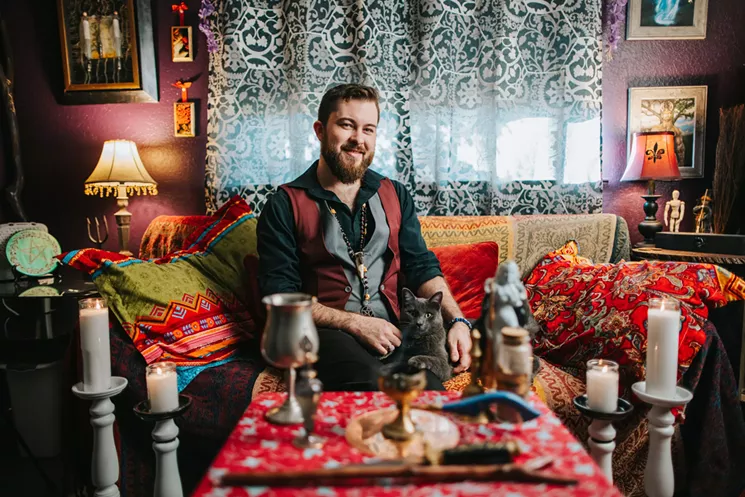
Nicholas Fly is a practicing Wiccan who occasionally has prophetic dreams, but who doesn’t claim to be clairvoyant.
Kathy Tran
“The community part of Wicca has kind of been hit hard because I can't get together with my coven or anything like that,” Fly says. “ … And that really does suck, because that’s one of my favorite things about traditional Wicca, practicing with other people. And there is just something that is so much more spiritually connecting when you're dancing naked in a circle with people that are like-minded than it is to be doing that by yourself in your bedroom.”
The fortune-telling business has boomed nationwide, even among jaded New Yorkers. The FBI reported a “slight uptick” in psychic scams this year. Dallasites continue seeking spiritual answers via crystals and tarot cards — even through Zoom-assisted worship. Another Pew Research Center survey found that 90 percent of subjects reported their church was closed and offering online alternatives.
Churches aren’t only a space for worship, but a means to foster communities, which is what the North Texas Church of Freethought aims to provide. The North Texas Church of Freethought isn’t a Satanic church, or even necessarily a haven for atheists. Rather, it is a church for people who “reject supernaturalism” and “emphasize facts and religion,” according to Timothy Gorski, one of its founders.
For more than 25 years, Gorski has been active in the church, where he serves as a “pastor.” This doesn’t make him an authority, he says, but he’s available to people looking for counsel.
“I call myself a free thinker,” Gorski says, “because I seldom think about God and the supernatural. Being human means that we should be able to question, doubt and be willing to exchange one view for a better view, one idea for a better one.”
While many of its members are opting not to physically congregate, Gorski says the Freethought community has recently grown.
“We have people join us on our Zoom calls who we have not seen before,” Gorski says. “With the internet, those people are able to join us from far, far away, whereas before, they would have to drive quite a ways if they were not nearby.”
With the Church of Freethought, Gorski wants to disabuse people of the notion that not subscribing to a religion is a bad thing. He encourages everyone, whether or not they are members of the church, to participate in thoughtful conversations and be open to changing their stances.
While he doesn’t claim to know what 2021 holds, Gorski believes things will only get worse if we don’t make an effort to listen to others.
“If you go through life thinking about God and praying to God and all this sort of thing, then it seems kind of scary that there's people out there who look at things from a different point of view,” Gorski says. “Look at all this angst and uproar over race when, in fact, we know that scientifically there really is no such thing as race.
“There are differences in all sorts of genetic traits, but there's no biological fact about race,” Gorski continues. “It's a cultural, social construct, and people are killing each other over it, making themselves miserable over it. Same thing with religion.”

